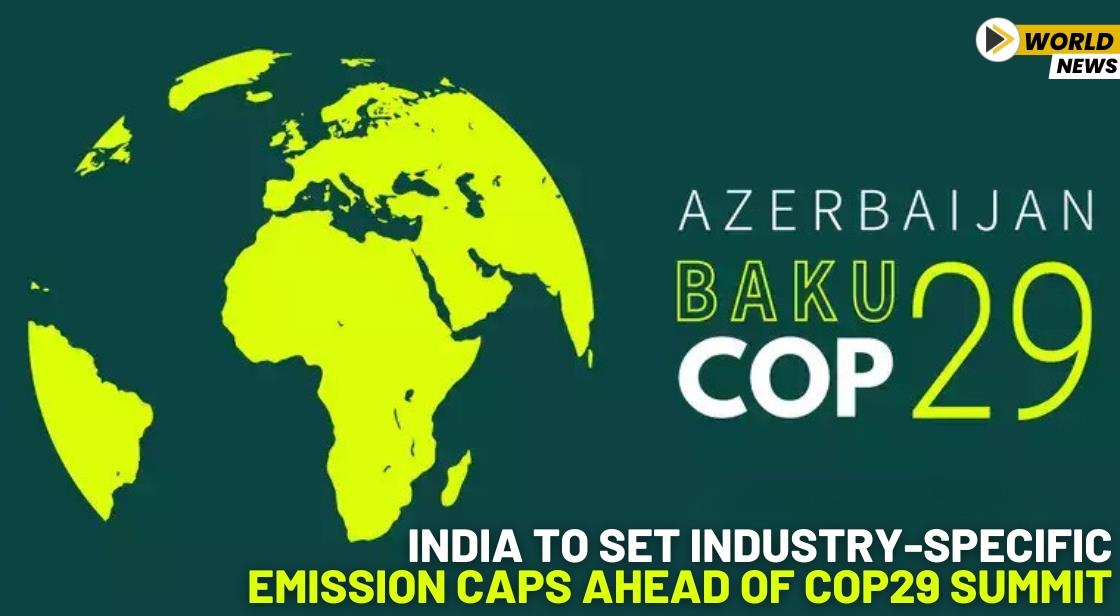India to Set Industry-Specific Emission Caps Ahead of CoP29 Summit

News Synopsis
India is on the verge of finalizing carbon emissions intensity targets for key industrial sectors as part of its preparation for the upcoming Conference of Parties (CoP29) in Baku, Azerbaijan, next month. The targets, which focus on reducing the carbon dioxide emissions per unit of production in selected industries, are expected to play a pivotal role in India’s commitment to combat climate change.
According to a senior official in the Ministry of Environment, these targets are at an advanced stage of decision-making, with final details expected soon.
Setting the Stage for a Carbon Market
The process of numerically specifying these emissions targets is a critical step toward establishing a 'compliance' carbon market in India. In this market, companies will be required to ensure their carbon emissions intensity is within a defined limit. If their emissions exceed the limit, they must purchase carbon credits from organizations that have achieved surplus reductions.
One carbon credit represents a tonne of carbon dioxide saved beyond the set target. The value of these credits will fluctuate based on market dynamics, such as supply, demand, and regulatory pressures. As explained by the Environment Ministry official, "We expect a final position on this very soon. There are still discussions going on with industry, but we want to ensure that the final document is clear and covers all aspects."
Framework and Oversight of India’s Carbon Market
India is obligated to launch its compliance carbon market in the 2025-26 financial year, as per a notification issued by the Bureau of Energy Efficiency (BEE) in December 2023. The market will be overseen by the National Steering Committee for Indian Carbon Market (NSC-ICM), which is co-chaired by the Secretaries of the Ministry of Environment, Forest and Climate Change, and the Ministry of Power. The committee will have "direct oversight" over the functioning of this market.
The new emissions caps for Indian industries will build upon the existing Perform, Achieve, and Trade (PAT) Scheme, under which industries are required to meet energy efficiency targets. The industries expected to fall under the compliance market include aluminum, chlor-alkali, cement, fertilizers, iron and steel, pulp and paper, petrochemicals, petroleum refineries, and textiles. These sectors are considered 'hard to abate' due to the high costs of implementing emission reduction technologies.
The Road Ahead: Global Climate Negotiations in Baku
As India moves closer to finalizing its domestic carbon targets, the international focus will shift to the CoP29 climate summit in Baku, where countries are expected to agree on new financial targets to help developed nations transfer resources to developing countries. Carbon markets are also expected to take center stage, with hopes that they will receive a formal green light under United Nations-backed climate charters.
Under the 2015 Paris Climate Agreement, Article 6 outlines the framework for operationalizing global carbon markets, which will allow countries to trade carbon credits. However, some unresolved issues related to the accounting of these credits remain. "There are still some outstanding issues on accounting for these credits. It is only once negotiations start next month that clarity will emerge," added the official.
Conclusion
India's finalization of industry-specific carbon emissions intensity targets is a crucial step towards building a compliance carbon market and advancing its climate action commitments. As the nation gears up for the 29th Conference of Parties (CoP29) in Baku, the outcome of these discussions will not only shape India’s domestic climate strategies but also contribute to global efforts in reducing carbon footprints.
With industries like aluminum, cement, and petrochemicals facing new regulations, the upcoming market for carbon credits could pave the way for sustainable growth while aligning with global carbon trading frameworks, as outlined in the Paris Agreement. As India continues to refine its strategies, the Baku summit will be a key moment in determining the global future of carbon markets and climate finance.
You May Like









